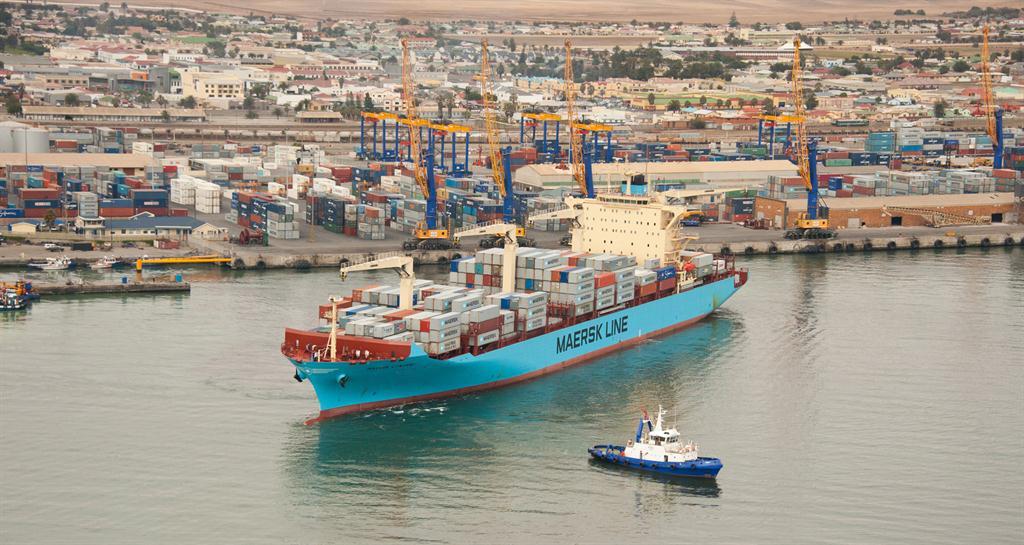Coronavirus silver lining for Walvis port
JEMIMA BEUKES
WINDHOEK
The coronavirus-inspired lockdown in South Africa is credited in part with increased cargo at the port of Walvis Bay, which has become preferred to the ports of Durban in South Africa and Beira and Maputo in Mozambique.
The other factor is the recent expansion of the port, officials confirmed.
Landlocked countries like Zambia, Botswana, the Democratic Republic of Congo and Zimbabwe now prefer shipping through Walvis Bay than South Africa.
According to the Walvis Bay Corridor Group's (WBCG) latest newsletter, the current lockdown measures due to the global coronavirus pandemic have resulted in changes to transport routes, as logisticians scramble to keep supply chains operational.
As such, the port of Walvis Bay and its corridors is seen as an efficient and secure trade route into southern Africa.
Compounded issues
Hippy Tjivikua, the CEO of the WBCG, yesterday clarified that this increase in cargo is compounded by the expansion of the port as well as the lockdown on South Africa.
“The issues of congestion of the South African ports started before the lockdown, last year already. The lockdown just compounded issues, so that is why others are talking about migrating to our port,” he said.
Tjivikua added that the port offers a string of advantages and said the WBCG has done its homework to attract more cargo.
He added that some of the traders and transporters who used Durban over the years have changed their supply routes to come through the Walvis Bay port.
This increase in cargo has ultimately led to transporters choosing to move essential goods destined for Namibia's neighbouring countries along the Walvis Bay-Ndola-Lubumbashi development corridor.
50 truckloads
In the newsletter, the WBCG's business development manager for South Africa, Irvaan Maharaj, pointed out that Zalawi Haulage, one of the main transporters operating on the north-south corridor, is a notable newcomer to this route.
Starting at the port of Durban, the route runs up into central Africa, and Zalawi currently moves about 1 700 tonnes of copper cathode from southern DRC to the port of Walvis Bay.
This translates to approximately 50 truckloads a month.
According to Maharaj, this success came after active engagement with the company.
“Bolloré Africa, together with their transporter Zalawi Haulage, needed a quick intervention to facilitate the movement of copper cathodes from Kolwezi. The WBCG and Namport's business development team assisted the company to ensure all the needed facilities, services and paperwork were in place,” he said.
[email protected]
WINDHOEK
The coronavirus-inspired lockdown in South Africa is credited in part with increased cargo at the port of Walvis Bay, which has become preferred to the ports of Durban in South Africa and Beira and Maputo in Mozambique.
The other factor is the recent expansion of the port, officials confirmed.
Landlocked countries like Zambia, Botswana, the Democratic Republic of Congo and Zimbabwe now prefer shipping through Walvis Bay than South Africa.
According to the Walvis Bay Corridor Group's (WBCG) latest newsletter, the current lockdown measures due to the global coronavirus pandemic have resulted in changes to transport routes, as logisticians scramble to keep supply chains operational.
As such, the port of Walvis Bay and its corridors is seen as an efficient and secure trade route into southern Africa.
Compounded issues
Hippy Tjivikua, the CEO of the WBCG, yesterday clarified that this increase in cargo is compounded by the expansion of the port as well as the lockdown on South Africa.
“The issues of congestion of the South African ports started before the lockdown, last year already. The lockdown just compounded issues, so that is why others are talking about migrating to our port,” he said.
Tjivikua added that the port offers a string of advantages and said the WBCG has done its homework to attract more cargo.
He added that some of the traders and transporters who used Durban over the years have changed their supply routes to come through the Walvis Bay port.
This increase in cargo has ultimately led to transporters choosing to move essential goods destined for Namibia's neighbouring countries along the Walvis Bay-Ndola-Lubumbashi development corridor.
50 truckloads
In the newsletter, the WBCG's business development manager for South Africa, Irvaan Maharaj, pointed out that Zalawi Haulage, one of the main transporters operating on the north-south corridor, is a notable newcomer to this route.
Starting at the port of Durban, the route runs up into central Africa, and Zalawi currently moves about 1 700 tonnes of copper cathode from southern DRC to the port of Walvis Bay.
This translates to approximately 50 truckloads a month.
According to Maharaj, this success came after active engagement with the company.
“Bolloré Africa, together with their transporter Zalawi Haulage, needed a quick intervention to facilitate the movement of copper cathodes from Kolwezi. The WBCG and Namport's business development team assisted the company to ensure all the needed facilities, services and paperwork were in place,” he said.
[email protected]




Comments
Namibian Sun
No comments have been left on this article